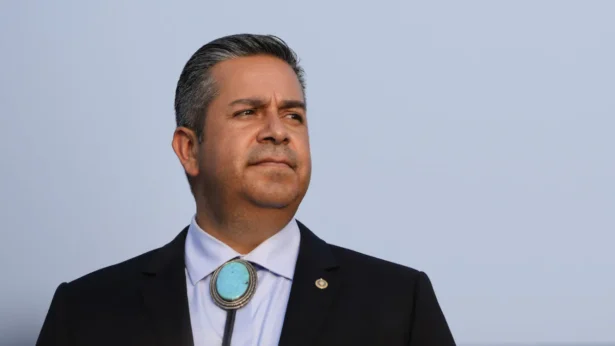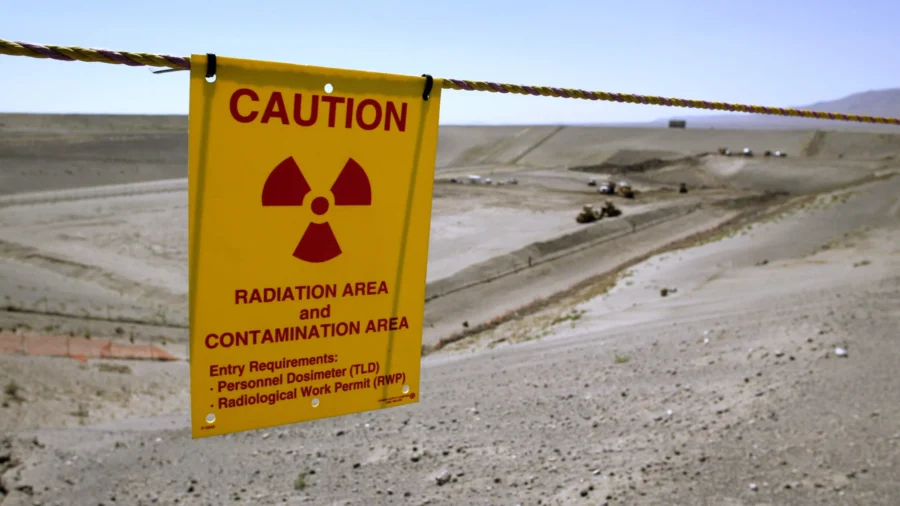Uranium ore was processed into weapons-grade plutonium on an industrial scale for the first time in a Mallinckrodt Chemical Co. plant north of downtown St. Louis, Missouri, in December 1942 as part of a secret project.
That first-generation plutonium, which existed on no manifest, was trucked to nearby warehouses along 19-mile Coldwater Creek, loaded onto coal trains bound for Canon City, Colorado, and eventually on to Alamogordo, New Mexico.
There, on a white sand desert in 1945, the Missouri-made processed ore fueled the Manhattan Project’s first atomic weapons test, and the subsequent Hiroshima and Nagasaki bombings that ended World War II.
Nearly 80 years later, senators from Missouri and New Mexico said during Dec. 12 floor proceedings on the draft $886.3 billion defense budget, or National Defense Authorization Act (NDAA), that this shared legacy links the states in ushering in the atomic age, sustaining the nation’s Cold War era nuclear weapons arsenal for decades, and in cancer-stricken families and poisoned lands.
Sens. Josh Hawley (R-Mo.) and Ben Ray Lujan (D-N.M.) said the price paid by workers who built “the bomb” and their families in sites across the country goes largely ignored by indifferent federal agencies.
More infuriating, both senators fumed in often fiery rebukes, is that an ungrateful Congress has failed for decades to adequately mitigate costs imposed to this day on former and present residents of communities sickened and scarred by radiation from nuclear weapons development and testing.
And even more shocking, they scolded the chamber, is their amendment to extend the expiring Radiation Exposure Compensation Act to sustain assistance to people and places struggling from nuclear fallout was yanked from the Fiscal Year 2024 NDAA.
“This is not right. These are good people who have done nothing wrong. Their government has caused this,” Mr. Hawley said.
“When the government causes injury, the government should make it right,” he continued. “That’s what we’re asking for, what the radiation compensation program does. It is wrong to let it expire. It is an injustice. It is a scar on the conscience of this body and on this nation.”
Their amendment, approved by the Senate 61–37 in July, was removed by Senate–House leaders in “a backroom deal,” Mr. Hawley said.
He chastised Senate Minority Leader Mitch McConnell (R-Ky.) and House Speaker Mike Johnson (R-La.) for allowing it to be cut as a “pay for” expenditure without a dedicated revenue source other than the general fund.
Mr. Hawley called that objection callous when considering “the billions of dollars in costs that the government has imposed on these people, taking their health, taking their lives, over decades” of often negligent exposure while building and sustaining the nation’s nuclear weapons arsenal.
He said while the NDAA is larded with $26 billion in “programs [DOD] doesn’t even want,” including $15 billion for 636 projects “the Pentagon says it doesn’t need,” Senate and House leaders “are saying, ‘We don’t have a dime for these people’ who have, let’s just tell it like it is, been poisoned by their own government.”
Mr. Hawley said federal agencies and Congress should demonstrate the faith in their nation these people did and do.
“These Americans are happy to do their part for national security. They’re proud of what they’ve done for their country, but they deserve to be recognized and they deserve to be compensated,” he said. “I want to say again to this body, that it is wrong to turn our backs on these tens of thousands of Americans who have given their health and, in many cases, their lives, for their country.”

Last-ditch Pitch Denied
Mr. Lujan argued removing the NDAA amendment is immoral and legally wrong.
“There’s a liability from the United States of America to these families,” he said, noting the extension would “cost some money” but in the long run, “when there’s a liability from the United States of America and you fix it, it actually creates credit, a path forward” to avoid future liabilities.
“We must reauthorize this program,” Mr. Hawley said. “We must do right by these Americans. They deserve it. This isn’t a welfare check. This is justice.”
Not shocking, however, was that the Hawley–Lujan last-ditch pitch to table the entire 3,093-page Fiscal Year 24 NDAA to reinstall their amendment failed in convincing 73–26 fashion.
Mr. Hawley acknowledged before the vote that fellow senators were “all too eager to move on” in adopting the defense budget, already more than two months late. Shortly after, the Senate agreed in an 85–15 vote to move the NDAA for floor adoption Dec. 13.
But rest assured, he said, the Manhattan Project will continue to live on in Missouri, as it has long since Mallinckrodt Chemical Co. closed its St. Louis plant in 1957.
Mr. Hawley said the atomic age’s seminal legacy remains embedded in Coldwater Creek, as evidenced in October 2022 when a 52-year-old Florissant elementary school was shuttered after tests found radioactive isotope lead-210 and polonium “far in excess of the natural background” in the 400-student school’s library, kitchen, HVAC system, classrooms, fields, and playground.
He cited names of people afflicted with cancers and “radiation-linked diseases,” from concentrations of children suffering from lymphoma and leukemia now, to the many died-young who grew up playing in Coldwater Creek “where the government left barrels of radioactive waste sitting out for years in the open. And for decades, the people of St. Louis were told: ‘Oh, there’s no problem. The creek is fine. No problem at all. You can play in it. Your kids can play in it.’”
The Manhattan Project will live on in Missouri because radiation illnesses “don’t just affect one generation,” Mr. Hawley said. “It’s generation upon generation because the United States government has not done what is right. It hasn’t cleaned up the contamination. It hasn’t made whole the families that they injured.”

Lethal Living Legacies
The Cold War will live on in New Mexico, where nuclear weapons testing continued through the 1950s, providing economic development and employment, including in uranium mining, Mr. Lujan said.
Yellowcake, a radioactive particulate dust created by uranium extraction, “would cover everything” in the mines and be tracked into businesses and homes across nearby towns, he said.
“Many of these families, namely the Navajo uranium mine workers, lived in a one-home generational house,” Mr. Lujan said. “So, if you go home and start shaking your clothing filled with yellowcake, what are you doing to grandma and grandpa? To your siblings? Your kids, maybe your grandkids? That particulate is now all around.”
The mining, development, and testing has spurred concentrations of cancers, pulmonary fibrosis, kidney failures, “medical traumas, and generational pain” for decades across rural New Mexico, he said, and continues to afflict “families who are dying from cancer today.”
And sadly, Mr. Lujan said, none of this is new.
He recalled past hearings where “Navajo elders, some ‘grandmas,’ as we call them, came to Congress” when he was in the House to testify about nuclear weapons testing fallout on their families and communities.
“During one of those conversations, one of those elders asked a question back to us on the dais. She said, ‘Are you waiting for all of us to die so that the problem goes away?’” he said.
“I don’t know what to say when I go home and see her because this legislation, which passed with a strong bipartisan vote in the Senate, has been taken out of the NDAA. What do I tell these families?”
From The Epoch Times

